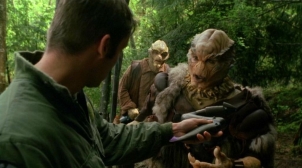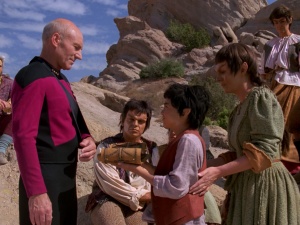This post is part of the series Anthropology in Outerspace which examines representations of anthropology in science-fiction. To read previous installments in this series, consult the related contents section at the end of this post or select the series in the ”Our Series” menu in the right sidebar.
Over the years, televised science-fiction has offered interesting ways of representing anthropologists within its narratives. The vast scope of anthropological characters ranges from peace-keepers (not the Farscape kind) to ignorant and selfish archeologists, and also includes inaccurate portrayals of the research methods used in anthropology. I offer a few of these fictional examples in order to juxtapose them against the reality of anthropologists today. Anthropologist Frank Salamone suggests that, “…the anthropologist in popular culture is one who defends the rights of the indigenous underdog, embracing cultural relativism and the cultural imperative to allow people to choose their own destiny” (2012:1). Let’s have a look at some examples.
Indeed, there are several cases of anthropologists advocating for marginalized and underrepresented people within the science fiction genre. In the Stargate SG-1 episode “Beast of Burden” (S5E7), Daniel Jackson learns that the Unas, a sentient alien species he has encountered before, have become enslaved by humans from another world. He proceeds to lead the charge in freeing them. In the Stargate SG-1 episode “Enemy Mine” (S7E7), Daniel Jackson plays the role of a mediator: the Stargate team has been ordered to mine a mineral located on the Unas’ sacred ground. In order to avoid war between the humans and the indigenous Unas tribes (and respect the sacred land), Jackson manages to prevent violence by becoming the mediator and peace-keeper within the conflict. This is a good example of how anthropologists can offer different perspectives to reach a better understanding between clashing peoples.
In the Doctor Who episode “Pyramids of Mars” (S8, E1-4), the archeologist known as Marcus Scarman, excavates a pyramid in Egypt in 1911. He is unsympathetic to the pleas of the local Egyptian population who demand that he stop the excavation on their sacred land. He even mutters under his breath that they are “superstitious savages” and continues the dig despite their warnings of a curse. He ignores the Egyptian indigenous knowledge and as a result becomes cursed.
From these fictional examples, we see moments when anthropologists are portrayed as defenders of the underdog, while other times they are shown as callous to the wants of local cultures. Mind you, this episode was written in 1975 and much as changed since then. Modern day archeologists may not be as ignorant (or selfish) as Mr.Scarman was portrayed, as their education and training includes cultural credentials.
Anthropologists in the past have not been as self-reflexive as they are today. Historically, sometimes anthropologists have contributed to the exploitation of the populations they were studying by assuming a privileged position. Presently, even though anthropologists can advocate for those in need of help, they respect that a) some people may not want the help, therefore it’s not a good idea to assume that they do or b) some people may not trust anthropologists because of past methods and historical encounters.
Blogger Tricia Ellis-Christensen, who holds a degree in English Literature, writes that “Star Trek tended to be similar in nature to the goals of cultural anthropology, to watch, but not to interfere with other cultures” (2011). She is presumably referring to Star Trek: TNG’s “Who Watches the Watchers” (S3, E4), in which a team of anthropologists secretly hide themselves away from the Mintakan people, who are less advanced technologically, in order to study them. They are discovered by the locals, however, and Jean-Luc Picard has to mediate a happy ending, not the anthropologists. The idea that anthropologists take a distanced, hands-off approach to studying other cultures is an old cliché.
Nowadays, anthropologists follow rigorous ethical standards and procedures before engaging with the people they hope to learn more about. Research is now done with participants’ consent, and anthropologists are careful to explicitly disclose why they are researching and what they hope to achieve. So although the Star Trek series may offer progressive views in some ways, such as staging the first interracial kiss on American television, the episode “Who Watches the Watchers” would not be an accurate depiction of anthropology today. Read a more detailed analysis here.
As well as encouraging informed participant consent in the research, some modern social anthropologists become a voice for people who are underrepresented or taken advantage of by those in privileged positions. For example, Anthropologist Alondra Nelson researches how the popularization of genetic research is a problem, as DNA technologies ‘geneticize’ racial and ethnic identities (2008:761). Her research also helps to expose how companies can persuade the general populace into buying a product (or identity) based on false information. Companies such as 23andMe warp scientific knowledge and purport claims to offer people their genetic histories. In fact, the data is highly skewed, inaccurate and perpetuates racial divides. Therefore, some anthropologists will study and critique the ways in which companies, or certain types of knowledge, are marketed and how they manipulate people into buying false information about their identities.
Star Trek, Stargate SG-1 and Doctor Who sometimes miss the mark when it comes to their depictions of anthropologists. Hopefully, both the examples I have provided and the analysis offers an interesting perspective of anthropologists in sci-fi and how those characters may or not be correctly portrayed.
References Cited
Ellis-Christensen, Tricia
2011 What is a Trekkie? Wisegeek. http://www.wisegeek.com/what-is-a-trekkie.htm accessed, June.17, 2014.
Salamone, Frank A.
2012 The Heroic Anthropologist Rides Again: The Depiction of the Anthropologist in Popular
Culture. Tyne:Uk Cambridge Scholars Publishing
Nelson, Alondra
2008 Bio Science: Genetic Genealogy Testing and the Pursuit of African Ancestry. In Social Studies of Science. 38(5):759-783.








Haha, as a scientist (and Stargate fan) I feel your pain about the warped versions of my field I encounter in some SciFi.
I think the genetic aspects of what make people and cultures different could be an intetesting – we know genes influence a lot of things and that there are some clear genetic differences between different groups of people. The important thing is to treat this idea with the caution it deserves – no one has found any clear cut links between genes and personality traits, let alone between cultural ideals. Thats because people’s identities are grown, not pre-ordained by genes. Sadly with topics like this, people tend to skew and exaggerate the smallest findings to fit their own agenda. We all need to educate ourselves when it comes to science to evaluate research critically, always questioning the motives of people who try to sell us their products or ideals…
LikeLike
Thanks for commenting, and sympathizing!
Your comment is relevant, but as you say addressing genetic differences has to be done carefully. As a sociocultural anthropologist, I tend to think that culture (and beyond that onthological and cosmological differences) and personnal experiences are what explain, first and foremost, differences among humans being. Perhaps a physical anthropologist would think differently: it would be interesting to bring one into this conversation! If you have additionnal thoughts which could be relevant to this discussion, I think they would certainly be worthy of exploring, especially considering that biological and genetic differences are often described as the causes for cultural differences in scifi. This could perhaps be the result of the delay between scientific progress and changes in popular thought, though. In other words, it seems to reflect theories which are no longer all the rage in social sciences, at least.
LikeLike